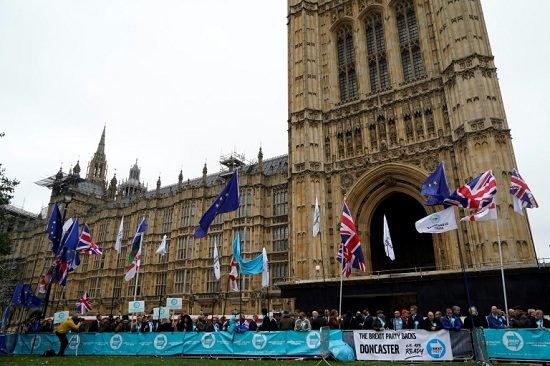This post has already been read 1660 times!
British and European negotiators ploughed on with Brexit talks Wednesday hoping that at least an outline deal can be found in time for the European summit.
European leaders will head to Brussels on Thursday hoping to decide whether to give the go-ahead to officials to draw up a final withdrawal treaty.
But first, EU negotiator Michel Barnier and European diplomats want to know if Britain’s Prime Minister Boris Johnson can sell the draft deal at home.
“The basic foundations of an agreement are ready and in theory tomorrow we could accept this deal with Great Britain and avoid the chaos and the misfortune linked to an uncontrolled, chaotic exit,” Donald Tusk, the president of the European Council, said on Poland’s TVN24 news.
“Theoretically, in seven or eight hours everything should be clear,” summit host Tusk added as negotiators prepared for a second gruelling late night shift at the Brussels conference table.
In London, Johnson met his sceptical Northern Irish allies the Democratic Unionist Party (DUP) for the third time in three days to try to shore up support for a compromise deal.
The DUP will find it hard to accept a reported offer to allow Northern Ireland to stick to EU customs rules after Brexit, which the EU wants to see to avoid the return of a hard border on the island of Ireland.
But DUP leader Arlene Foster scoffed at “nonsense” reports that she is ready to give way. “Discussions continue. Needs to be a sensible deal which unionists and nationalists can support,” she tweeted.
Brexit minister Steve Barclay described the closed-door meetings in Brussels as “intensive” and confirmed Britain would ask for another Brexit extension if there is no deal by Saturday.
Irish leader Leo Varadkar, meanwhile, warned that “many issues remained to be resolved” and suggested that a more realistic target was “an agreement by the end of this month”.
Briefing European commissioners, Barnier confirmed that “ongoing talks have been constructive but there still remains a number of significant issues to resolve.”
Earlier, Barnier had said a draft of any deal would have to be ready by early Wednesday if it was to go before European leaders at their summit, which begins on Thursday.
European officials close to the negotiations express cautious optimism but doubts over the idea that a detailed draft can be completed in time, despite positive rumours driving the pound higher on currency markets.
Instead, European diplomatic sources said, the leaders expect to make one of three choices.
– ‘Committed to leaving’ –
They could either give the nod to the draft text that Barnier and UK negotiators are drawing up as the basis to a formal treaty or agree that the talks are promising and set a timetable for further work.
Or, more pessimistically, they could conclude that the two sides are still so far apart that new ideas are needed if Britain is to avoid crashing out of the bloc without a deal on October 31.
The summit is sue to begin on Thursday afternoon, but it is not yet clear when the Brexit portion will come up.
Johnson has promised to take the UK out of the European Union on October 31, with or without a follow-on agreement to maintain orderly economic ties with its former partners.
A British government audit, published Wednesday, added weight to fears of a catastrophic economic breakdown in the event of a “no deal” exit, forecasting a 45- to 65-percent cut in cross-Channel trade for up to a year.
Against this background, Barclay confirmed to British MPs that Johnson would on Saturday comply with a UK law requiring him to send Brussels a letter calling for a Brexit delay if no deal was found.
But he insisted: “We’re committed to leaving… on October 31. We think the best way of doing that is with a deal, to leave in a smooth and orderly way.
 AFP/File / ISABEL INFANTESBritain’s Prime Minister Boris Johnson insists he wants to leave the EU on October 31
AFP/File / ISABEL INFANTESBritain’s Prime Minister Boris Johnson insists he wants to leave the EU on October 31
“That is why the team are, as we speak, involved in intensive negotiations to do that.”
Many European officials are pessimistic about the chances of a rapid deal, but none publicly rule it out.
France’s European affairs minister Amelie de Montchalin said: “Of course it is possible, it has been possible for three years.”
More intense talks resumed this week after Britain had softened its stance on the customs status of Northern Ireland in order to clinch an accord before the summit.
But a marathon late-night negotiating session in the EU’s Brussels headquarters brought them to the eve of the meeting with still some distance to go.



